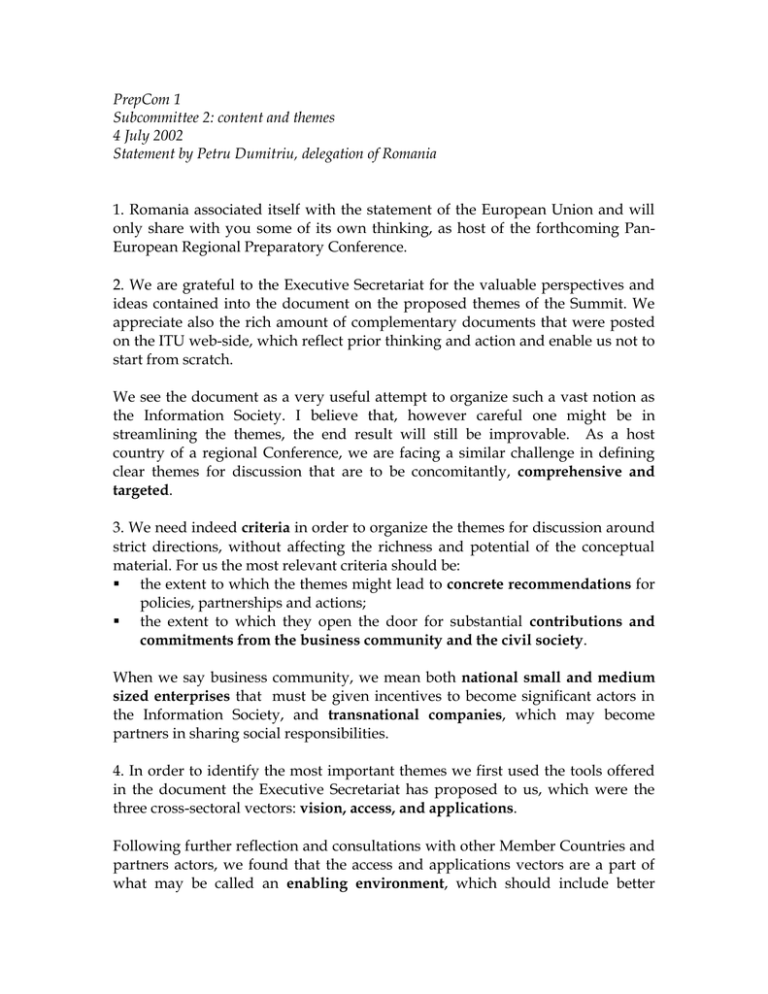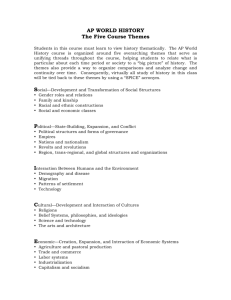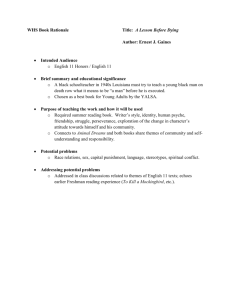PrepCom 1 Subcommittee 2: content and themes 4 July 2002
advertisement

PrepCom 1 Subcommittee 2: content and themes 4 July 2002 Statement by Petru Dumitriu, delegation of Romania 1. Romania associated itself with the statement of the European Union and will only share with you some of its own thinking, as host of the forthcoming PanEuropean Regional Preparatory Conference. 2. We are grateful to the Executive Secretariat for the valuable perspectives and ideas contained into the document on the proposed themes of the Summit. We appreciate also the rich amount of complementary documents that were posted on the ITU web-side, which reflect prior thinking and action and enable us not to start from scratch. We see the document as a very useful attempt to organize such a vast notion as the Information Society. I believe that, however careful one might be in streamlining the themes, the end result will still be improvable. As a host country of a regional Conference, we are facing a similar challenge in defining clear themes for discussion that are to be concomitantly, comprehensive and targeted. 3. We need indeed criteria in order to organize the themes for discussion around strict directions, without affecting the richness and potential of the conceptual material. For us the most relevant criteria should be: the extent to which the themes might lead to concrete recommendations for policies, partnerships and actions; the extent to which they open the door for substantial contributions and commitments from the business community and the civil society. When we say business community, we mean both national small and medium sized enterprises that must be given incentives to become significant actors in the Information Society, and transnational companies, which may become partners in sharing social responsibilities. 4. In order to identify the most important themes we first used the tools offered in the document the Executive Secretariat has proposed to us, which were the three cross-sectoral vectors: vision, access, and applications. Following further reflection and consultations with other Member Countries and partners actors, we found that the access and applications vectors are a part of what may be called an enabling environment, which should include better 2 delineation of four directions to be followed to give substance to a possible plan of action: strategies (at national, regional and global level), regulatory framework and related domestic legislation, improving access and connectivity, enriching applications and content. 5. The domains to be covered are broadly defined according to thinking and incipient practice at regional level, respectively e-government, e-learning and einclusion. We also believe that any overall assessment of policies and action should try to encompass and define the consequences in terms of the quality of life in the information society. 6. At this last point, we operate with a crucial criterion for judging not only the themes, but also the impact of the Information Society: the positive consequences on daily lives of people, not only in some parts of, but all around the world, not on the elites exclusively, but on the ordinary people. That is a way to say that going further and deeper in a world so much influenced by the information and communications technologies does not exclude risks and does not always translate into exclusively positive impact. Our vision on the future should continue to be based on a human centred development. 7. Certainly, the quality of life in the Information Society is in itself a complex issue. We see sub-items like combating cyber-delinquency in all its aspects, promoting Internet ethics, protecting privacy, enhancing environmental monitoring and energy efficiency, organizing intelligent transport systems, developing social and educational services, stimulating multi-cultural emphasis and local content are relevant to the quality of life. As it was emphasized in numerous interventions in the plenary sessions there is also an all-encompassing connection between the potential of the Information Society and the need for more democratic and participatory ways of governance.





